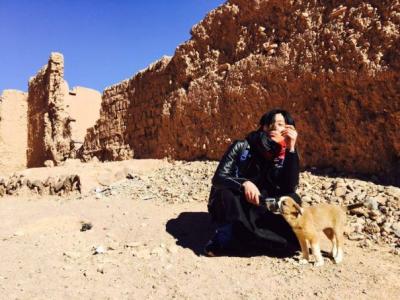
From Bebop to K-Pop: R&B Artist Minje
The R&B musician Minje is influenced by a multitude of music styles and art forms, from Nam June Paik's video art to Chet Baker's trumpet-playing. For him, music is always hybrid and creates a wave that is constantly moving to connect people.
One of the newcomers among the artists under the label Stone Ship1 is Minje, who released his first album Mojo, and a mixtape freesms, both in 2016. Often labeled an alternative R&B artist, he actually used to perform a large variety of music genres as a teenager, preferring Western musicians like Stevie Wonder or Prince, who would always integrate something new or something different to express their feelings or the feelings of a decade. At the same time, one can also find influences from early Korean rock musicians of the 1960s and 1970s like Shin Jung Hyun, or from decades-long trendsetting Japanese composers like Sakamoto Syuichi or Hisaishi Joe.
It is important to mention the larger context of where Korea fits into the enduring debate about cultural appropriation in the music industry. With a Music Agency like Stoneship, who have some of the most important underground hip hop groups under their label (Vis Major), one could be tempted to look for the influence of Black and hip hop music, which is quite often the topic in underground music.

A Wave that Stands for Life
Having had the chance to meet Minje in Seoul in August 2016, I was surprised to discover that a musician age group with such profound knowledge of the larger context of the history of music in South Korea and Japan, as well as the US or Great Britain. He elaborated on trends in different epochs and regions. To him, it is a question of the conscious perception of a multitude of trends and flows that influence, inspire and also connect individuals through music. He uses the metaphor of the wave to describe the interconnectedness that is in constant movement, always changing and still the same.
It this therefore not surprising that in the music video for «Do» the river is a very dominant motif. The video is filmed in reddish light that turns sometimes to violet and blue, plunging the viewer into a dreamlike atmosphere, without clear borders, floating in time and space. This sensation reaches its apex with the meeting of the artists in the sequence about the river. The wave also stands for life, which is in an ongoing never-ending flow connected with everything everywhere. This state of mind - or rather «flow of mind» - goes into the music, integrating elements from genres and stories from elsewhere, but still expressing the experience of life of the artist.
For him, making music in South Korea is therefore not a question of appropriation. He contradicts the position of most critics who would discuss new music trends as hybrid forms between – mainly – US-American music and the continuously diminishing elements of Korean styles. On the contrary, Minje would not even call it appropriation or hybridity, but he would rather see the dialogue and exchange between multitudes of voices that merge as a response to a given situation.
Chet Baker's Teeth
One of his main objectives is therefore to create music that offers an alternative perspective and an alternative experience via the music he creates. This objective is quite unique in the context of the dominant K-pop wave, including hip hop, which has grown so successful that even indie groups and a considerable number of underground rappers have joined the mainstream. Minje’s mission to make a difference by offering the public a means to express their feelings, hopes and visions through music is a venturous endeavor.
Furthermore, going against the tide again, Minje strives to be a Korean artist who embraces all streams and all tendencies to create an alternative music that appeals to a public who gets inspired by the same «wave-length». Music would therefore convey the experience of the artist in all its vibes and fibers. As an illustration of his position, he uses the example of the Jazz musician Chet Baker who played with Charlie Parker, among others. The episode conveys the spirit of Jazz that inhabits the musician, as it focuses on the fact that Baker continued to play trumpet even after having lost his teeth in a fight, despite the difficulty and the pain. The physical pain has to be overcome but, but it resonates in the music. All the references Minje uses focus on music that is inhabited by shared experience by individuals, independent of a national, ethnic or temporal relatedness.
A Trance-like Flow
Minje chooses to refer to other arts as long as it supports the transmittance of the experience. For the music video with the title «fxxked up», Minje draws inspiration from the Korean video artist Nam June Paik, who is known for his works that use screens and videos as raw materials for sculpture and painting. The video was directed by Dong Hyeokso, the director of flipevil, in close cooperation with Minje. The song «fxxked up» features a smooth melody that creates a trance-like flow, with some upheavals that capture the feeling of being lost in a megalopolis like Seoul with its complex time-space-continuities.
Two young men are wandering through streets and across bridges, the sequence’s flowpunctuated by flickering images that indicate the disruption of the flow, which only once really stops for the insert of the title «fxxked up», before the flow of images with the strolling of lonely figures continues, endlessly. The music and the images join magically to transmit the spirit of the young generation caught in between the burden of the past and the promises of future inscribed in the silhouettes of the glimmering city.
These two examples illustrate Minje’s style that, while part R&B, draws on a multitude of inspirations. The music tells his story of a world that is linked and in which all - music, images, feelings - is in a continuous flow that can connect those who are willing to listen to the music. His most recent offering of connectivity is his new album, boy II man, which was released in January 2017.
Biography
Published on February 10, 2017
Last updated on April 10, 2024
Topics
A form of attachement beyond categories like home or nation but to people, feelings, or sounds across the globe.
Why do people in Karachi yell rather than talk and how does the sound of Dakar or Luanda affect music production?
From afrofuturist parallel worlds to decoding strategies of emancipatory sounds: Examinations of music striving for a life worth living.
